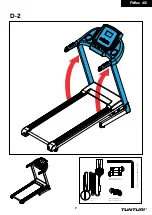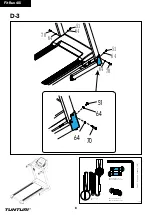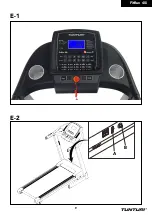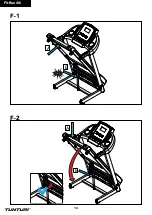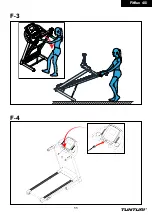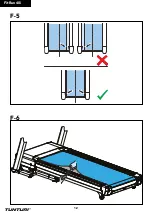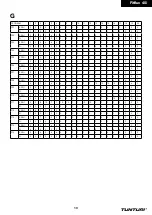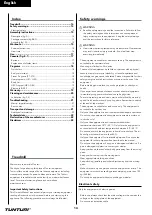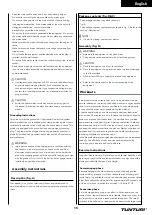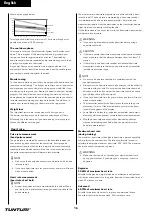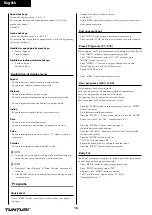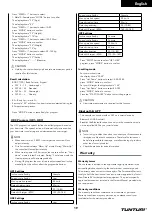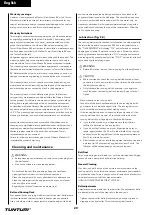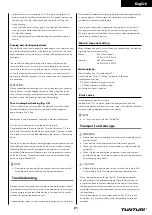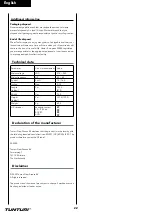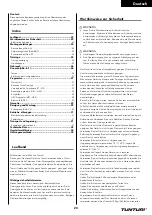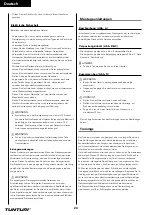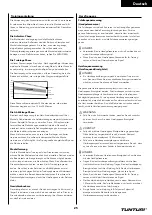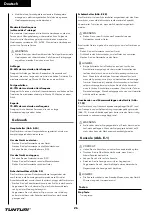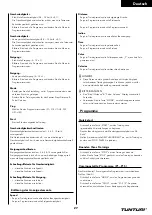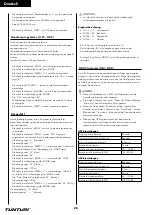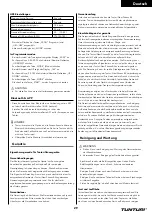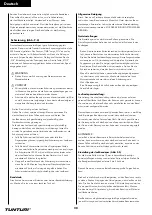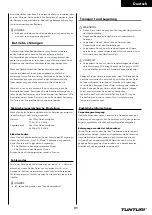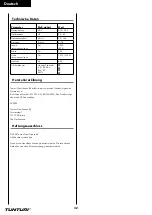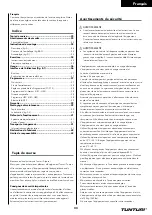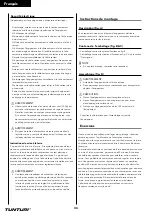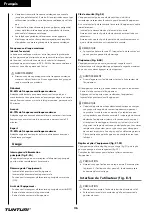
2 1
English
adjustment bolts in increments of 1/4 turn each and inspect for
proper tension by walking on the belt at a low speed, making sure
the belt does not slip. Keep tensioning the bolts until the belt
stops slipping.
- If you feel the belt is tight enough, but it still slips, the problem
may be a loose Motor drive belt under the front cover.
- Do Not Over-tighten
Over tightening will cause belt damage and premature bearing
failure�
Running belt tracking adjustment
The performance of your treadmill is dependent on the frame running
on a reasonably level surface. If the frame is not level, the front and
back roller cannot run parallel, and constant belt adjustment may be
necessary�
The treadmill is designed to keep the running belt reasonably
centered while in use. It is normal for some belts to drift near one
side while the belt is running with no one on it. After a few minutes
of use, the running belt should have a tendency to center itself. If,
during use, the belt continues to move toward one side, adjustments
are necessary�
EXCEPTION:
During rehabilitation where the user is using one leg much stronger
than the other, it might happen that the running belt drifts to one
side. In these cases you should not adjust unless the running belt
does not centre itself during normal condition usage.
To set running belt tracking (fig. F-5)
A 10 mm Allen wrench is provided to adjust the rear roller. Make
tracking adjustments from the left side only. Set belt speed at
approximately 3 to 5 kph.
Remember, a small adjustment can make a dramatic difference!
Turn the bolt clockwise to move the belt to the right.
Counterclockwise to move to the left. Turn the bolt only a 1/4 turn
and wait a few minutes for the belt to adjust itself. Continue to make
1/4 rotation turns until the belt stabilizes in the center of the running
deck�
The belt may require periodic tracking adjustment depending on use
and walking/running characteristics. Some users will affect tracking
differently. Expect to make adjustments as required to center the
tread-belt. Adjustments will become less of a maintenance concern
as the belt is used. Proper belt tracking is an owner responsibility
common with all treadmills.
‼ NOTE
•
Damage to the running belt because of incorrect running-belt
adjustments is not covered by the products warranty.
Troubleshooting
Despite continuous quality control, defects and malfunctions caused
by individual components may occur in the equipment. In most cases
it’s unnecessary to take the whole device in for repair, as it’s usually
sufficient to replace the defective part.
If the equipment does not function properly during use, contact your
Tunturi dealer immediately. Always give the model and serial number
of your equipment. Please state also the nature of the problem,
conditions of use and purchase date.
If you require spare parts, always give the model, serial number of
your equipment and the spare part number for the part you need.
The spare part list is at the back of this manual. Use only spare parts
mentioned in the spare part list.
Metric/ Imperial setting
When displayed speed is not matching your expectation the machine
might be set in incorrect setting.
Metric:
Min./ Max. speed/:
1.0 Km/h/ 16.0 Km/h.
Imperial:
Min./ Max. speed/:
0.6 Mls/h/ 10.0 Mls/h.
Switch units by:
Take off safety key. ( Console show E7)
Press and hold “Prog” & “Mode” button for 3 seconds.
Console shows shortly:
- 0.6 When switched to Imperial mode.
- 1.0 When switched to Metric mode.
Put Safety key back in position�
Error codes
If the display shows an error code
(marked with “E” + number), restart the equipment and check
whether the display still shows the error code. If the display still shows
the error code, immediately contact the dealer.
‼ NOTE
•
E7 is not an error code, see “Safety key”
Transport and storage
⚠ WARNING
•
Before cleaning and maintenance, remove the mains plug from
the wall socket.
•
Carry and move the equipment with at least two persons.
•
Make sure that there are no other persons or objects under the
equipment.
•
When folding the folding the equipment, make sure that you
hear the equipment lock into position to prevent the equipment
from dropping back down.
⚠ CAUTION
•
Before folding the equipment, make sure that the incline is 0%.
If the incline is not 0%, folding will damage the mechanism.
- Move the equipment as shown (fig. F3). Move the equipment
and carefully put the equipment down. Place the equipment on
a protective base to prevent damage to the floor surface. Move
the equipment carefully over uneven surfaces. Do not move the
equipment upstairs using the wheels, but carry the equipment by
the handlebars.
- Store the equipment in the upright position (fig. F1). Store the
equipment in a dry place with as little temperature variation as
possible�
Summary of Contents for 17TFRN4000
Page 2: ......
Page 3: ...3 FitRun 40i A...
Page 4: ...4 FitRun 40i B...
Page 9: ...A B 9 FitRun 40i E 1 E 2...
Page 10: ...A B CLICK A B 1 0 FitRun 40i F 1 F 2...
Page 11: ...1 1 FitRun 40i F 3 F 4...
Page 12: ...1 2 FitRun 40i F 5 F 6...
Page 91: ......

